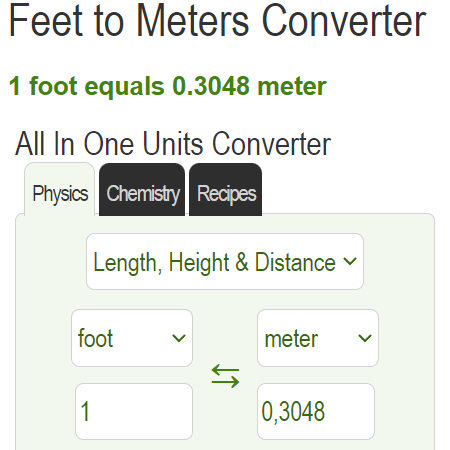28.8 barleycorns to centimeters
28.8 barleycorns are equal to 24.48 centimeters
Barleycorn To Centimeter Converter
| ⇆ | ||
|
|
||
|
🔗 Help our site grow by sharing it!
|
||
To find the value in barleycorn that corresponds to a value in centimeters, multiply the value in barleycorns by 0.85 (the conversion factor). Here is the Conversion formula
Value in centimeters = value in barleycorns × 0.85
Let's say that you have 28.8 barleycorns and you want to convert it to centimeters. By using the conversion formula provided above, you get:
Value in centimeter = 28.8 × 0.85 = 24.48 centimeters
This conversion formula works because one centimeter is equal to 1.17647 barleycorns.
To convert a different value in barleycorns, simply replace the value in the formula above with the new value.
What is the Relationship Between Barleycorns and Centimeters
The Exact Relationship is Defined as follows:
1 centimeter = 1.17647 barleycorns
This means that to convert a measurement from barleycorns to centimeters, you multiply the value in barleycorns by 1.17647.
Using The Calculator
Here is how to switch from barleycorns to centimeters:
- Determine the measurement in barleycorns that you are working with: For this example, let's use
28.8 barleycorns. - Apply the formula: Multiply the value in barleycorns by 0.85:
Value in centimeters = 28.8 × 0.85 - Perform the calculation: Youmay use want to use a calculator or do the math:
Value in centimeters = 24.48 centimeters - Round the result: Depending on your needs, round the result to three decimal places:
28.8 barleycorns ≈ 24.48 centimeters
Quick Tips For Mental Math
If you don't have a calculator handy, or you want to do a quick mental estimate, you can approximate:
- Use 0.9 instead of 0.85 for a rough estimate.
- For example:
- 1 barleycorn ≈ 0.85 centimeters, (0.85, exactly)
- 2 barleycorns ≈ 1.7 centimeters, (1.7, exactly)
- 3 barleycorns ≈ 2.6 centimeters, (2.55, exactly)
Conclusion
You've learned how to convert barleycorns to centimeters and vice versa! Use the formula centimeters = barleycorns × 0.85 for accurate results, or approximate using quick mental math for a rough estimate.
Common Questions This Converter Can Answer
Basic Conversions
- How many barleycorns are in 28.8 centimeters?
- 28.8 barleycorns are equal to how many centimeters?
- What is 28.8 barleycorn in centimeters?
Conversion Methods
- How do I convert from barleycorns to centimeters?
- What is the conversion factor between barleycorns and centimeters?
- What formula should I use to convert barleycorns to centimeters?
Practical Applications
- How do I measure barleycorns in centimeters?
- What's the equivalent of 28.8 barleycorn when expressed in centimeters?
- How can I convert between barleycorns and centimeters for my project?
Common Conversions
- What is 1 barleycorn in centimeters?
- How much is 10 barleycorns in centimeters?
- What's half a barleycorn in centimeters?
Professional Use
- How do I convert barleycorns to centimeters in technical documentation?
- What's the precise conversion rate from barleycorns to centimeters?
- How do international standards convert between barleycorns and centimeters?
Definition of Barleycorn
A barleycorn is a traditional English unit of length, equal to one-third of an inch (approximately 8.47 millimeters). This historical unit:
- Historical Significance:
- Basis for shoe size measurements
- Traditional English measurement system
- Agricultural measurement standard
- Modern Applications:
- UK and US shoe sizing
- Historical reenactment
- Traditional crafts
Definition of Centimeter
A centimeter (cm) is a metric unit of length equal to one hundredth (1/100) of a meter. This practical unit is widely used in everyday measurements, particularly for small objects and body measurements. One centimeter is approximately the width of an average adult's fingernail. In conversion terms, one centimeter equals 0.3937 inches exactly. Centimeters are commonly used in clothing sizes, furniture dimensions, rainfall measurements, and medical examinations. This unit is particularly useful in education, as it provides an easily understandable scale for teaching measurement concepts to students. In technical applications, centimeters are often used in engineering drawings, crafting, and precision woodworking.



